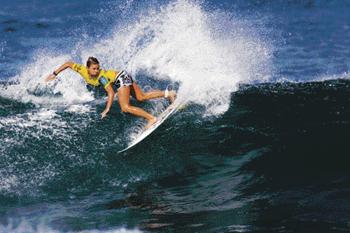SUNSET BEACH, O‘ahu — The ASP Athlete Rules and Discipline Committee announced Monday that the Coco Ho -in/interference incident, which occurred Thursday, Nov. 20, at the Reef Hawaiian Pro in Hale‘iwa, O‘ahu, has been resolved.
After conducting numerous interviews and reviewing written accounts of the incident prepared by spectators, athletes, ASP judges, and other officials, and after carefully reviewing videotape of the incident and subsequent press accounts from the involved athletes, ASP rules judge Robert Gerard has determined that the incident was not only unfortunate, but should not have occurred.
Gerard’s ruling involves no monetary fine for Coco Ho, but rather involved a lengthy counseling session and orientation to the rules and the protocol of expected sportsmanlike behavior during ASP events. Robert emphasized that Ho was not only 100 percent cooperative and professional during the course of his investigation, but is nothing short of “heartbroken” over the incident and the subsequent controversy.
Gerard also received detailed input from the ASP technical committee during his investigation.
According to Gerard, “Coco is a fine young athlete and person and as a result of my investigation, notwithstanding the countless opinions being thrown about in the surf media and blogs, I am completely satisfied that this incident was the result of over-zealousness in the dying moments of a final heat by a 17-year-old competitor who was simply trying to get a score and qualify for the ASP Women’s World Tour. I could go on in great detail about what was going on in Coco’s mind at the time of -in/interference, but I am convinced that it was not directed toward harming Layne Beachley’s efforts to secure a win.”
Gerard added that the incident was particularly unfortunate in that Beachley has been an outstanding seven-time ASP women’s world champion, and has been one the finest female athletes to grace the sport. Since this is her retirement year, to be deprived of the opportunity to win an event in an exciting clutch situation is surely a major disappointment to Beachley. Having reviewed the videotape of the heat, Gerard did agree that the wave in question presented Beachley an opportunity to attain the score of 6.83 she needed to win the event. True to her level of professionalism, Beachley chose not to weigh in during the investigation, but rather to accept Ho’s apology and to focus on the upcoming Roxy Pro at Sunset Beach, which started yesterday.
As for the winner of the heat and the event, Carissa Moore, Gerard concluded that Moore had absolutely nothing to do with the incident and that Carissa should be proud of her win and of her ongoing success in the sport. “Carissa and her dad Chris contributed to my investigation in the professional fashion that I expect of all ASP athletes.”
During the investigation Gerard did learn from several sources that many young surfers are being trained to “go for broke” and get any wave possible if time is running low and they are behind in a heat without proper regard to the -in/interference rules. Gerard believes that strategy is potentially dangerous (particularly in large surf) and that it also does not fit within the spirit of the ASP’s sportsmanship requirements.
Gerard will promptly work with the ASP Technical Committee to evaluate the ASP Rules regarding “intentional” -ins and interferences. Currently, the only ASP penalty for a -in/interference on another surfer is an interference call during the heat. The current penalty for a second -in/interference during a heat is removal from the heat and a $500 fine.
When asked about the applicability of the ASP’s unsportsmanlike conduct rule to the Ho situation, Gerard determined that it simply did not apply given Ho’s state of mind. To determine that Ho that was in violation of that rule, Gerard would have had to determine that Ho thought through the entire scenario and purposely pedaled in to help Carissa Moore seal the win.
According to Gerard, “despite various reports to the contrary, some of which misquote Ho, the facts simply did not bear out any such conclusion. Concluding that this was some sort of conspiracy between Ho and Moore is wrong and it does a great injustice to these two young athletes. Both Coco and Carissa are rising stars in the sport and they are both anxious to play by the rules. Moreover, as very gifted Hawaiian surfers they are also both keenly aware of the special role that aloha plays as a foundational element of surfing.”
For her part, Ho states, “I feel so badly about this incident, especially since it involved Layne who I hold in such high regard and who has done so much for women’s surfing. I have certainly learned a lot from this whole experience and I am stoked that the ASP did not just go by the rumors and the press, but worked with me and my coach and my family to make sure I got to apologize and use this as a learning tool. For me, I just want to look forward and be the best I can be and I want to do everyone proud including my family, my sponsors, Hawai‘i, my country and the sport.”


